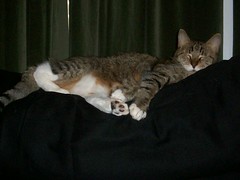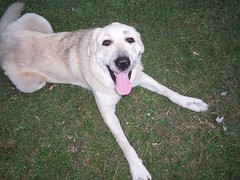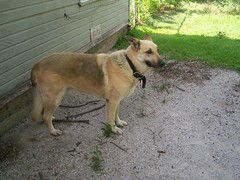There's a lot of discussion about the OMGWTF Nursing Shortage and of how to get younger, more diverse folks into nursing. What I've seen lately proposed as solutions make sense, but they don't get to the root of the problem: Nurses are seen as handmaidens and helpmeets to doctors rather than as scientific professionals in their own right, who often practice with a surprising degree of autonomy.
Two illustrations of that, from the educational angle: I have a colleague who never fails to mention that she finished pre-med school at the top of her class, passed the MCAT, and was accepted to medical school, but took to nursing as a sort of Med-Lite second-best when she decided she wanted to have kids and a husband. Further back, when I was starting nursing school, every single dadratted classmate I had, practically, said with starry eyes that she "wanted to *help* people!" as a reason for getting into the business.
Now, helping people is a fine undertaking. I do a lot of it myself every day, though I think of it in terms of educating my patients or working with other disciplines in the hospital to help those patients heal. And going from med school to nursing is a fine thing, too, (though I disagree with the reasons here), as it gives you a different perspective on the science of nursing.
But nursing is way, way more than helping people and being a sort of handmaiden to a big, strong, masculine-smelling doctor. By not emphasizing the technical, intellectual, skilled aspects of nursing practice, we're losing a lot of possible nurses to PA school or computer science courses. "They Dare To Care" is a touching ad campaign, but it doesn't showcase what we do every day as practitioners of a science that is equal to but different from medicine.
I'm not going to list out here what I do every day that could be considered intellectually challenging and deserving of respect; I've done that over and over in previous posts. Instead, let's look at the Helpful Handmaiden misconception and see how it impacts nursing as a whole:
First, public perception of nursing focuses too much on the "caring", touchy-feely aspect of the work. This discourages people like me, who are a little crusty and a little crotchety, from entering the profession, for fear of encountering a bunch of fuzzy-headed huggers with little or no spine. It took working with nurses for me to realize how wrong that stereotype was.
Second, take that public perception again, and narrow it down: Nurse equals handmaiden, which equals subordinate role, which means that any man in nursing must be happy with a subordinate role, which means any man in nursing must be gay. And a bottom, to boot. With that stereotype, you may now kiss still more of your potential nurses goodbye, as they go into manly sciences like software development and electrical engineering.
Third, let's take the Helpful Handmaiden Model onto the college campus: If nurses are primarily caregivers and assistants, then there's not much to teach students, is there? Therefore, we can pay a pittance to our nursing instructors and not lose out.
Let's be blunt, here: Being a nursing instructor, especially in a small department like the one at the school where I got my degree, must suck. College instructors don't have cushy jobs as it is--growing up in a family of academics taught me that--but being told you're responsible for lesson plans and teaching three courses a semester, *plus* two clinical groups, *plus* being required to sit on various committees and boards, is particularly challenging in terms of time and creativity.
To add insult to injury, the school where I went required at least a master's degree in nursing to teach lower-level classes. A PhD in nursing was preferred for upper-level classes. That's a lot of education...and I, as a brand-new, fresh-out-of-the-gate nurse with no experience, made double what the instructor of my first nursing courses made. After six years, I'm making more than the best-qualified instructor at that school, for considerably less effort.
In short, if you want decent nursing instructors and enough of them, you have to treat nursing with the respect it deserves. Helpful Handmaidens don't get no respect, but careful, observant scientists do.
Fourthly and finally, let's take that Helpful Handmaiden into the hospital and see what that stereotype does to us as a profession.
If nurses are primarily interested in Helping People, and if they're assistants to Big Manly Doctors, it means that they therefore are selfless martyrs. Selfless martyrs don't mind being saddled with too many patients, being told to work mandatory overtime, and being shorted vital equipment, supplies, and support staff. Selfless martyrs, after all, welcome the opportunity to make do and mend and do everything themselves.
Now let's imagine what would happen if we had the concept of nurses as scientists and advance troops on the line of patient care: We'd get staffing. And supplies. And a say in how hospital policy is developed. And support staff, so we don't have to clean rooms and take out trash. And lower patient ratios, so we could actually, you know, *monitor* and *educate* patients and provide better care. We'd get better-qualified professors in nursing departments who could actually afford to make a living. The phenomenon I encountered, that of an instructor so burned out on nursing practice that he or she couldn't stand to be in the hospital any more (and communicated that dissatisfaction to the students) wouldn't be as common. And, finally, we'd get a more interesting, diverse, experienced crowd going to school.
How do we get to the point where the handmaiden stereotype is dead? Activism, education, being loud and pushy (frankly) with hospital administrators, and--most importantly in my view--never downplaying what we do.
I am not "just" a nurse. When people say, "You seem awfully tough for a nurse", I respond, "Nurses are tough." When somebody asks me why I didn't go to medical school, I tell them that I prefer nursing both because of the range of knowledge I have to master and the flexibility it gives me with my patients. When a patient tells me I'm "too smart" to be a nurse, I ask them seriously if they want a moron coordinating their care. And every time I meet a nurse-to-be, I hand out my email address and tell 'em to contact me if they want help, advice, or just to blow off steam.
It'll take a while to change the stereotype. It'll take a lot of work, too, but it's the only way to reverse the trend of younger nurses getting burned out and leaving the field as older nurses hang on out of guilt. Helpful Handmaidens are handy to have around the house, but they don't get stuff done. Pushy Smart Tough Professionals do.


